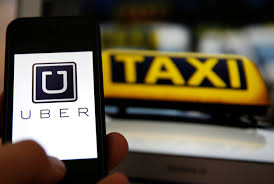In
case you have never heard of the names Travis Kalanick, Garrett Camp and Oscar
Salazar; those young men are the founders of Uber (formerly Ubercab), the hot
ride-hailing service that has taken the (global taxi) world by storm. Uber is
today a $51 billion company that has disrupted the taxi industry in the USA,
and continues to disrupt the Taxi industry in every of the 58-plus countries it
has entered since it launched on May 31st 2010.
What
they did?! ...They automated a comfortable and easy way for average urban dwellers to get
a taxi ride, or make money by the side as impromptu taxi drivers. You can read Travis’ account of
how they came about the Uber idea, and guess what? What you know as Uber today somewhat differs from what they conceived that day!
So
also Airbnb, a $16 billion company that has today successfully automated the way an average
person can make money from renting out a free bed-space in his house to A
COMPLETE STRANGER!
Credicoins
wants to make it easy for the average human being living in a ‘third world
country’ to achieve their financial dreams by leveraging on the efforts, time
and resources of another human being (wherever they may live). And we intend
using all the technological means possible to do that for third world dwellers
in order to help eradicate poverty in the world and create a more balanced
financial ecosystem.
We
want to be the ‘Uber of cooperative societies’. And it all starts from a
savings culture.
 |
| Hands around the coop logo |
Why
cooperative societies are commoner in the developing world
SACCO
is an acronym for Savings And Credit Cooperative Organisation, and they are popularly
referred to as Credit Unions in developed economies. You can’t talk about, or
do a research on poverty eradication without (encountering) them, especially in
the developing world.
Like
I have explained on this blog,
the poor (in developing countries) too have dreams of wanting to go on
vacation, sending their children to good schools, having a house of their own,
etc, but they find it hard to fulfill those wishes, due in part to the corruption
of the governments of their countries. They therefore form cooperative societies
in order to do what the government should have done for them – buying vast lands in order to build houses for members, building grocery stores which will sell cheaper
groceries to members, giving out loans to members without collateral and at
lower interest rates to what the banks charge, among other benefits.
However,
in every society, either developed or developing, you find humans congregating
to help themselves. And even today due to the advent of technology and the
internet, you find such web companies/ideas as Prosper, Lending club, etc, and
you also see crowdfunding ideas such as Kickstarter
and Gofundme thriving as a result of helping inventors, authors, and other
creative people to easily raise funds for their projects from the public
without an IPO.
The world has gone collaborative, opensource, P2P, and so on- the sharing economy is now a viable business model.
| credit:trendguardian.com |
Facebook,
Apple and Microsoft could only have come from Harvard and the University of
California
If
you have not read the book “Outliers; the story of success” by Malcolm Gladwell, you should. There,
Malcolm with his unique evidence-based journalistic style explains why such
technological companies as Microsoft, Apple and Dell could not have been
incorporated at any other time in history. And so even if you were a scientific
genius more brilliant than Leonardo Da Vinci, Albert Einstein and Nicola Tesla
put together, and you were born before the 1950s, you could not have become a
tech billionaire like Bill Gates, Steve Jobs, Steve Ballmer, Michael Dell, and the likes...interesting
read.
In typical Gladwell thinking, Facebook could only have come out of Harvard (or Stanford,
Yale, Princeton, and the likes). And there is a reason for that. Research shows
that intelligence is largely inherited (in the genes), but children of the rich, on the average are more intelligent (and more successful) than the children of the
poor. (Some of you will say for obvious reason.) And so, it is more likely that
any idea/solution/invention that will disrupt an industry or change the world
is more likely to come from someone who grew up in a rich home, or who attends/attended
the (ivy league) schools the rich children attend.
Though
if you say this to the poor, they will think you are proud because you are
intelligent and richer than them. Some will argue that they can’t afford to
give their children an ‘expensive education’. But it is this very attitude that
keeps them poor. The poor need to start doing what the rich do (for their children).
The
poor need to develop ‘the mindset of the rich’, which I refer to as the Wealth Mentality. That is their surest way out of poverty.
Thank
you for reading.


No comments:
Post a Comment